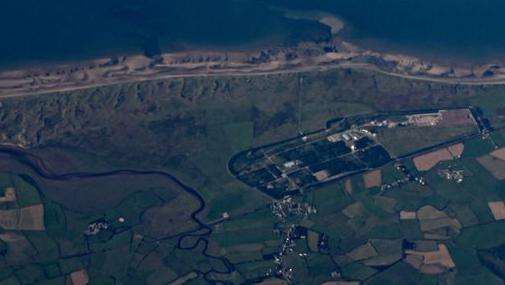Nuclear waste storage facility told to take action after breach

The Environment Agency said action needs to be taken after conditions were breached on the environmental permit for the LLWR site at Drigg in west Cumbria
- Published
A nuclear waste storage facility has been told to take action, after it breached its environmental permit.
The Environment Agency (EA) has written to bosses at the Low Level Waste Repository (LLWR) in Cumbria with concerns about a delay in securing waste at the site.
Nuclear Waste Services (NWS), which manages LLWR, said the delays did not have an impact on the surrounding area and that they had taken the time to ensure the right solutions were created for the safe disposal of nuclear waste.
The EA said it could not comment on the matter due to impartiality rules during election periods.
The letter, written by the EA in January, and obtained by the BBC through a Freedom of Information request, sets out new conditions that LLWR must comply with.
It comes after LLWR failed to make sufficient progress on operations to secure the radioactive waste - known as capping - meaning it breached the terms of its environmental permit.
Missed deadline
Martin Walkingshaw, chief operating officer at NWS, said: "Placing the engineered cap over the legacy radioactive waste disposal facilities at the UK’s LLWR is a first of its kind activity for the UK."
He said Nuclear Waste Services were engaged with the Environment Agency on a regular basis about progress.
He added: "Capping is a key part of the disposal, and we are currently implementing the required design by procuring, importing and emplacing thousands of tonnes of capping materials in line with our planning conditions and stringent quality requirements."
In their letter, the Environment Agency also told LLWR it had failed to meet a deadline for a previously imposed improvement condition, regarding a request for a written plan to protect waste in certain areas, including capping one of them.
While the plan was delivered, there were delays in implementing it.
An initial date of completion of 2028 had been agreed with the EA, but discussions are now under way to extend the deadline as LLWR believes more time is needed.
NWS has blamed delays on issues with the design of the engineered cap.
"Throughout the design phase a number of assumptions were tested, as is common practice. Not all of these assumptions held true, and one in particular, caused a significant change in design."
Follow BBC Cumbria on X (formerly Twitter), external, Facebook, external and Instagram, external. Send your story ideas to northeastandcumbria@bbc.co.uk.
Related topics
- Published29 July 2010
- Published7 February 2013